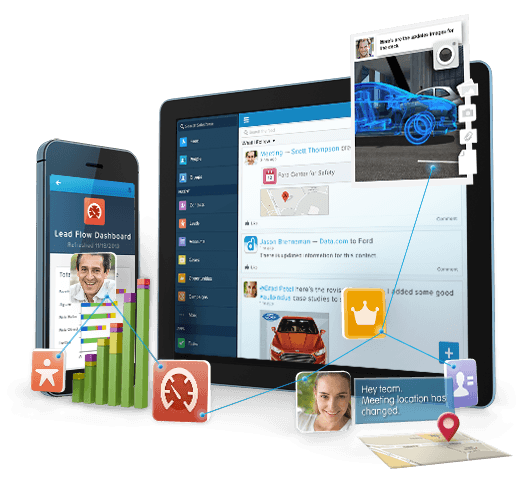“Does My Small Business Need a CRM?”
What is CRM?
CRM is an abbreviation for Customer Relationship Management software. CRM software, typically based on a monthly subscription for solutions that store your content securely and allow access from any browser, can help your business manage some of the tasks that are critical to your success, including:
- Collect and store contact information such as names, addresses and phone numbers
- Collect and store account (i.e. companies, vendors and organizations) information such as locations, number of employees, websites, etc.
- Store and associate emails, files and documents with contacts and companies
- Organize contacts by specific attributes such as “iPad user” or “is price sensitive”
- Initiate, record and track calls, conversations, and meetings
- Schedule actions, follow-ups and events for individual or groups of contacts
- Track and measure sales activities results (new prospects, proposals outstanding, won and lost sales)
- Track and measure marketing activities and results (source of leads, newsletter subscribers, seminar attendees)
- Design and generate reports that can help to forecast future business, improve closing rates, or compare sales reps.
You Already Are Using a CRM
You might not realize it, but you already are using a CRM . . . of sorts. For example, you have a pen, Post-It notes and an address book where you record contact and account information. You use Outlook to organize incoming emails. Your Google Calendar helps you schedule and track appointments. Your desk full of manila folders with proposals, notes, sketches and newspaper clippings is a method of organizing physical information.
This mix of physical and digital tools is your way of collecting, organizing, prioritizing and acting upon the thousands of bits of information that bombard you from prospects, clients, vendors and employees.
Have you have ever been frustrated because a competitor won a piece of business that you weren’t aware of, or were embarrassed in front of a client because you couldn’t access their proposal that was sitting in a folder at home? If you have, then you have experienced the angst that a CRM can eliminate.
In it’s simplest form, a CRM links all of the conversations, notes, proposals and service calls from you, your staff and the client in one centralized, easy-to-access location. A well-designed CRM also highlights the most important interests, characteristics and “hot buttons” of prospects and clients, insuring that every conversation and communication is focused, relevant and sensitive to the recipient’s needs.
How Does a Firm Know if it Needs a CRM?
Our rule of thumb is that if you believe your business would improve if you could add an hour to the day, then you will profit from using a CRM.
Here are three qualifying questions you might ask yourself when considering the potential value of investing in a CRM.
- If an important client called while you were on the road, could you immediately put your hands on your staff’s client notes, the proposal sent a year ago, and the recent invoice she might be calling about?
- If you were considering hiring your first salesperson, would you be able to calculate the average number of days it took to close a sale, the amount of revenue expected in the next 90 days, or the number of leads a new salesperson could call in their first week?
- If you found a time-sensitive piece of industry intelligence, could you quickly identify the 20 top prospects with whom to share it and would you be able to send the information in a personalized email within 10 minutes?
If the answer to any of the questions above was “no”, then you should consider investing in a CRM.
Is It Worth the Investment?
At the lowest level, a well-designed CRM and proper training will leverage an entrepreneur’s time, increasing selling and customer service activities by a meaningful, measurable amount. Start your analysis by considering the value of obtaining one new client a month, or increasing the number of prospects you can touch by 10%. This back-of-a-napkin analysis will offer a sense of the potential pay-off.
The Value of a CRM Extends Far Beyond Workplace Efficiencies
Every entrepreneur understands the critical importance of improving and deepening their relationship with existing customers. The rapid adoption of social media has created dozens of new ways to listen to and engage prospects and clients in a conversation. Unfortunately, active engagement on Facebook, Linkedin or Twitter takes time and a well-designed CRM can reduce the amount of time and effort required to maintain social channels.
 Think about the number one source of new customers for most businesses – referrals. By increasing the frequency and authenticity of your interaction with existing customers, and tracking their activities and interests, a CRM can maximize your ability to not only earn repeat business, but also to generate more referrals.
Think about the number one source of new customers for most businesses – referrals. By increasing the frequency and authenticity of your interaction with existing customers, and tracking their activities and interests, a CRM can maximize your ability to not only earn repeat business, but also to generate more referrals.
And there are many other benefits from integrating a CRM into your broader online marketing process. For example, raw leads captured from your website can be automatically entered into a CRM and pre-qualified based on the expressed interest of the inquiry. When a new lead comes in, the CRM can also automatically schedule a “To-Do” for you, insuring that inquiries receive an immediate response.
Our FREE CRM Worksheet & Analysis
2.0heads specializes in helping businesses increase sales and customer engagement through the integration of a customized CRM into their sales, marketing and online processes. We offer a no-cost, no-obligation analysis that will help you determine the value of a CRM to your business.
In less than 15 minutes we can help you determine the potential ROI from a CRM and to offer advice on things you should consider when evaluating CRM options.
Updated:



